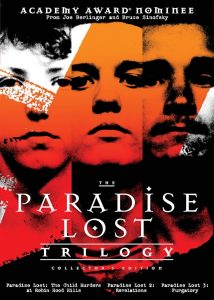 In Leslie Jamison’s book The Empathy Exams, there is an essay called “Lost Boys.” This essay goes over the documentary Paradise Lost: The Child Murders at Robin Hills, and what conclusions people drew who had watched it when the documentary first came out. To summarize the documentary to get a brief idea of what this essay discussed, it goes as follows: Three boys were murdered in a low-income neighborhood, and the three people that are accused of these murders are three teenage boys because they were goth and people believed they were using the murders as a ritual to summon Satan. Though the boys “confessed,” it was not a true confession. The police officer that brought them in coerced them into confessing to the murders. For years the teenage boys had been in prison for their crimes, even though they did not commit them. The documentary also goes into the families of the passed and their reaction/response to the boys being accused of the murder. Eventually, the teens, now adults, were finally released and they had a retrial that stated they were not guilty.
In Leslie Jamison’s book The Empathy Exams, there is an essay called “Lost Boys.” This essay goes over the documentary Paradise Lost: The Child Murders at Robin Hills, and what conclusions people drew who had watched it when the documentary first came out. To summarize the documentary to get a brief idea of what this essay discussed, it goes as follows: Three boys were murdered in a low-income neighborhood, and the three people that are accused of these murders are three teenage boys because they were goth and people believed they were using the murders as a ritual to summon Satan. Though the boys “confessed,” it was not a true confession. The police officer that brought them in coerced them into confessing to the murders. For years the teenage boys had been in prison for their crimes, even though they did not commit them. The documentary also goes into the families of the passed and their reaction/response to the boys being accused of the murder. Eventually, the teens, now adults, were finally released and they had a retrial that stated they were not guilty.
Because the documentary was made to show the innocence of the accused, it made the entirety of the trial and imprisonment look as if it was a witch-hunt. That everything was based on the fictitious beliefs of a police force and the people of the neighborhood that were caused by a lack of education because they lived in a low-income area which meant the public schools did not get funding for better classes. However, it also shows the parents of the three boys that were murdered and their reactions to the teens being accused of their sons’ deaths. They cursed the teens, wishing horrendous things to them as they walked out of court. The parents discussed their hatred towards them in the documentary, making the parents a villainous figure along with the police officers. As the audience first watched the documentaries, there was strong negative feedback towards the parents. A great example about how editing creates heroes and villains in an originally true, and heartbreaking, story. Jamison even discusses her disdain for the parents and the anger she felt when first watching it:
When I watched these films as a teenager, I got drunk. I wanted to feel things without thinking them through. Anger lifted me into a sentimental flurry urgent enough to match what I’d seen. These film-makers are curators of outrage; they entrust you with an injustice it hurts to hold… I got drunk and pretended to be a lawyer. I gave impassioned speeches to my hallway mirrors. This is not justice! I delivered closing arguments to no one.
Though there is truly empathy for the teens when this documentary was first shown to the public, Jamison goes against the grain of editing and asks an important question, where is the empathy for the parents? The parents of the boys who were brutally murdered are indeed horrible to the teenagers, but everyone who has watched the documentary is horrible to the parents. There is an injustice that is being served to the parents who are angry at the people they have been told killed their children. While everyone wants justice for the teens, there is no reminder that if it is not them who committed the crime, then it is someone else who got away with it. The parents need to believe it is them in order to have their anger channeled into a person rather than a faceless silhouette that will never be known. Jamison admits this, stating, “In getting mad at them [the parents], I suspect I’m doing precisely what I hate the system for doing: looking for a scapegoat.” Empathy is more than one side. Empathy is looking at the collective story, listening to the people affected by tragedies, and understanding that there are people who have reasons for being “villains” in other people’s stories. I empathize with the parents who are desperate to put a name/face to the murderer of their children and have some form of justice done to that person. However, I also empathize with the teenagers who were convenient targets for people to accuse them because there was an inability to understand their alternative lifestyles.